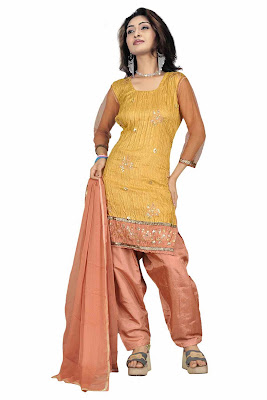Girls Kameez Definition
Source (google.com.pk)
Salwar Kameej is worn by many Indian girls and women today all over the
country. However, this apparel belonged to North India and has been
designed to cover complete body.
Kameej: Technically it means a shirt. However, ladies style this in
different ways. This one starts from the shoulders can can end anywhere
in mid-thighs or extend till the knees. It depends on current fashion.
There are several different cuts used. The tighter ones need minute
cutting where as the loose ones are easier. The neck border can be
decided on. There are several patterns available. A kameej can be simple
cotton or can be made out of more expensive materials like the silk.
Women love embroideries and Jardosi (glittering intricate embroidery)
made by the experts.Salwar: This is the bottom. It starts at the navel
and makes a very comfortable wear. It is either loose on the thighs and
remains so only to become a little narrow so it can stay on the ankle.
The salwar always matches the Kameej fabric. It can be either the same
fabric or use a matching one. There are different types of salwars. The
fittings ones are more like leggings and the loose ones are traditional.
A salwar kameej is generally accompanied by a dupatta or a 2 mtr. long
fabric. This ones matches or compliments the salwar kameej. Since the
fabric is long, this one is most designed one. Most expensive salwar
kameej have dupattas that are full with designer embroidery and cut
work. Cost of these varies widely.The naksha, a Persian device like the
Jacquard loom invented centuries later, enabled Indian weavers to create
sinuous floral patterns and creeper designs in brocade to rival any
painted by a brush. The Kashmir shawl that evolved from this expertise
in its heyday had greater fame than any other Indian textile. Always a
luxury commodity, the intricate, tapestry-woven, fine wool shawl had
become a fashionable wrap for the ladies of the English and French elite
by the 1700s. The supply fell short of demand and manufacturers pressed
to produce more, created convincing embroidered versions of the woven
shawls that could be produced in half the time. As early as 1803,
Kashmiri needlework production was established to increase and hasten
output of these shawls, which had been imitated in England since 1784
and even in France. By 1870, the advent of the Jacquard loom in Europe
destroyed the exclusivity of the original Kashmir shawl, which began to
be produced in Paisley, Scotland. Even the characteristic Kashmiri
motif, the mango-shape, began to be known simply as the paisley.The
paisley motif is so ubiquitous to Indian fabrics that it is hard to
realize that it is only about 250 years old. It evolved from 1600's
floral and tree-of-life designs that were created in expensive,
tapestry-woven Mughal textiles. Early designs depicted single plants
with large flowers and thin wavy stems, small leaves and roots. As the
designs became denser over time, more flowers and leaves were compacted
within the shape of the tree, or issuing from vases or a pair of leaves.
By the late 1700s, the archetypal curved point at the top of an
elliptical outline had evolved. The elaborate paisley created on Kashmir
shawls became the vogue in Europe for over a century, and it was
imitations of these shawls woven in factories at Paisley, Scotland, that
gave it the name paisley still commonly used in the United States and
Europe. In the late 1700s and 1800s, the paisley became an important
motif in a wide range of Indian textiles, perhaps because it was
associated with the Mughal court. It also caught the attention of poorer
and non-Muslim Indians because it resembles a mango. "Rural Indians
called an aam or mango a symbol of fertility".
Girls Kameez
 |
Girls Kameez
|
 |
Girls Kameez
|
 |
Girls Kameez
|
 |
Girls Kameez
|
 |
Girls Kameez
|
 |
Girls Kameez
|
 |
Girls Kameez
|
 |
Girls Kameez
|
 |
Girls Kameez
|
 |
Girls Kameez
|






No comments:
Post a Comment